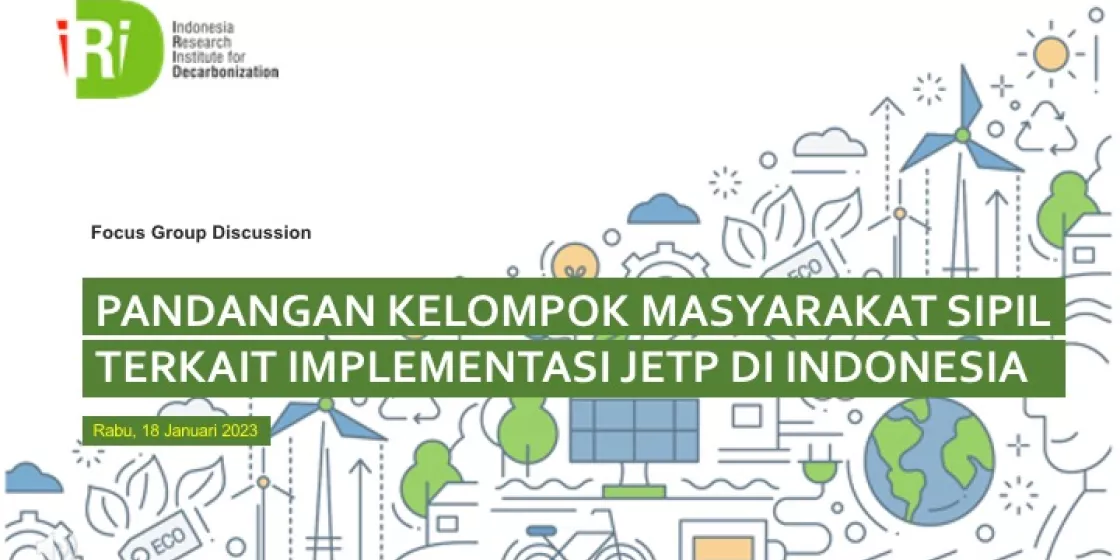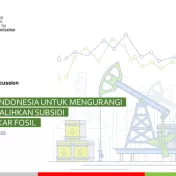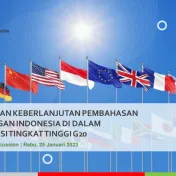Indonesia's Just Energy Transition Partnership (JETP) is one of the outcomes of the G20 Summit that Indonesia hosted in 2022. The partnership is an agreement between Indonesia and the countries of the International Partners Group (IPG). It aims to mobilise finance for Indonesia to decarbonise and phase out the construction and operation of coal-fired power plants.
The partnership requires Indonesia to develop an investment plan, in particular for the energy sector, within six months. The investment plan is expected to reflect Indonesia's need to reduce greenhouse gas emissions in the energy sector. It should aim to peak at 260 million tonnes CO2eq of absolute greenhouse gas emissions in 2030, from a baseline of 357 million tonnes CO2eq in the same year. However, it is important to ensure an inclusive process, such as the involvement of civil society organisations (CSOs) as key stakeholders in the development, planning, implementation, and monitoring of the investment plan.

Fig. 1. Summary of Partnership Action Plan for Indonesia JETP within 3 months of announcement

Fig. 2. Summary of Partnership Action Plan for Indonesia JETP with 6 months of announcement
The Indonesia Research Institute for Decarbonisation (IRID) and Germanwatch hosted a special focus group discussion with CSOs including relevant research institutions on 18 January 2023 at the Pullman Hotel, Jakarta. The discussion was held to obtain feedback and input from CSOs working on topics related to the JETP to observe what civil society groups already have, and also to communicate what they need to pay attention to. It was based on the results of IRID's discussion ‘Understanding the G20 and COP27 Outcomes and their Impact on the Energy Sector in Indonesia’ on 22 December 2022.
One of the main issues discussed was the involvement of CSOs in the JETP process in Indonesia. Until 9 February 2023, when this blog post was first published, it was still unknown how CSOs would be involved and which role they would be playing in the process of drafting, planning, implementing, monitoring, and implementing the JETP. It is therefore crucial for CSOs to come together and discuss their role and function in the context of the JETP. During the discussion, the participating CSOs also tried to widen the debate to include the social and economic aspects of the energy transition, particularly those related to employment, rather than just electricity matters.
The discussion is attended by a number of CSO representatives in Indonesia, including a number of invitees Tata Mutasya, Head of Climate and Energy Campaign, Greenpeace Indonesia; Grita Anindarini, Deputy Director of the Indonesian Center for Environmental Law (ICEL); and Maria Emeninta, Head of the Research, Education and Training Department of the Confederation of Indonesian Trade Unions (KSBSI).
JETPs role in the energy crisis
The energy crisis has been a catalyst for a global shift from fossil fuel dependency to renewable energy sources. Conversely, the energy crisis has provided Indonesia with an unexpected windfall.
The JETP demonstrates the availability of funds to accelerate the energy transition in developing countries, including Indonesia. However, there is a need to ensure that the JETP can be implemented in an equitable manner.
Indonesian coal sector
If we take a look at the current situation, several things need to be considered when implementing the energy transition. For example, the coal sector is still considered the most easily exploitable energy source today, given its ready availability. Indonesia is also the country with the largest expansion in new coal capacity, with an increase of about 44% between 2017 and 2020 (Ember Climate, 2022). Fossil energy also appears more affordable because external costs such as emissions costs are not included. This is certainly a challenge for Indonesia in its energy transition away from fossil fuels.
Indonesia’s underdeveloped labour and renewable energy sectors
The ratio of renewable energy capacity to total energy capacity of G20 countries has generally increased between 2017 and 2021. However, Indonesia experienced a 0.1% decrease as coal-fired power plants expanded much more than renewable energy capacity increased (International Renewable Energy Agency, 2022).
The big picture of Indonesia's just energy transition leaves out social aspects such as labour. So far, there is no clear concept and roadmap for labour related to Indonesia's commitment to achieve the Nationally Determined Contribution (NDC), Low Carbon Development Indonesia (LCDI), and Long Term Strategy for Low Carbon and Climate Resilience (LTS-LCCR).
In fact, Indonesia also lacks consistent labour data, including data and information on how many people work in the coal sector. According to the Manpower Planning and Development Agency (Barenbang), for example, the Ministry of Manpower recorded 165,784 coal mine workers in 2021. By contrast, the Ministry of Manpower officially stated at the Energy Transition Working Group (ETWG) Forum in 2022 that the coal sector employed about 1.2 million workers.
Just Transition urgency in Indonesia
In the discussion, several aspects related to the need for a just transition emerged:
- The need to strengthen the just transition framework, which includes policies related to finance, industry, climate, energy, and electricity, and the just transition itself.
- The need to assess the vulnerable groups most affected by the transition, in particular women, children, mining communities, and workers.
- The need to introduce environmental instruments as safeguards. There is also a need to strengthen the role of local governments in implementing energy decentralisation and transition scenarios, especially for employment.
The discussion also led to a debate on a more narrow definition of a just transition. The same goes for the definition of green jobs, especially since the term ‘green jobs’ is currently only linked to jobs in the fields of renewable energy or cleaner energy, amongst others, but does not include the quality of human well-being.
With regard to the more technical perspective on the just energy transition, the participating CSOs also discussed captive power plants and how to phase them out. They also discussed the importance of revising Indonesia's Nationally Determined Contribution (NDC), especially in terms of re-specifying conditional emission reduction targets; that is, reducing emissions with international assistance. Furthermore, they reviewed the included ‘clean coal’ technology, which is expected to no longer be considered a climate change mitigation effort.
Indonesian JETP future
Based on the discussion, civil society organisations have identified a number of issues to monitor and address in relation to the JETP process in Indonesia.
First, CSOs need to identify how they can advocate on issues related to the plan for a New Energy and Renewable Energy Bill (EBET Bill) and the JETP Investment Plan in parallel. Concerning the EBET Bill plan, CSOs need to consider the inclusion of new energy (that is, nuclear energy or gasified coal), the clarity of incentives and priorities for renewable energy, procurement arrangements, TKDN (domestic component portion in manufacturing), and the assessment of affected communities. With regard to the JETP Investment Plan, they need to consider the flow of information and transparency from all parties as well as the monitoring of the content, for example with regard to plans for the funding instruments to be used and their allocation.
Second, CSOs need to agree on the definition or scope of the just energy transition. This will make it easier for them to coordinate their joint activities.
Third, CSOs should establish a coordination platform that makes all information related to the JETP accessible to more parties, and allows all parties to contribute to the development, planning, implementation, monitoring, and evaluation process of the JETP. Another important consideration is to ensure the continuity of the JETP after the end of the Joko Widodo administration in 2024.
------------------------------------------------------------
This blog post was first published in Bahasa on 10 February 2023 by our partner organisation Indonesia Research Institute for Decarbonization (IRID). To access the original article, please follow this link.





